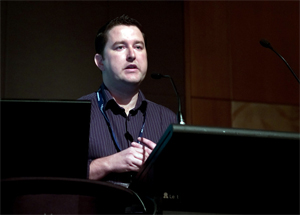AusNOG vital for the future: Vocus CEO

Mentoring young network engineers through the Australian Network Operators Group (AusNOG) is key to keeping the industry alive, according to James Spenceley — chief executive officer (CEO) of wholesale telecommunications company, Vocus Communications.
Spenceley said he and Pipe Networks co-founder and recent Vocus board appointee Steve Baxter ran the first annual AusNOG event off their credit cards in Sydney. He said it was a great way for younger people to get in a room with more experienced engineers to share their ideas and experiences in the industry.
"It's one of those things that unless we ensure there's a next generation of engineers and people interested in the business end of technology, the industry is in trouble," he said.
Although his commitments with Vocus have forced him to reduce his involvement in the group over the years, Spenceley said the mentoring was vital to ensure new engineers would be aware of the ins and outs of networks.
"15 years ago when I was connecting my first customers to an [internet service provider], you could actually make a mistake and take the whole network down for five minutes and you wouldn't lose your job. 10 years ago you could probably take down part of the network and you wouldn't lose your job. Today if one of my engineers took down any part of my network for a minute or so he'd almost lose his job unless he had a bloody good reason," he said.
"So your ability to learn and test yourself on the job is decreasing. And that's a real shame," he said. "It's probably where we need to be with the internet being such an important part of our life but it's much harder for people to get hands on experience in a senior role than it was."
Spenceley said it was hard to find experienced people in the industry and said people who had 10 years working in a high pressure network environment were invaluable.
"More experienced industry people need to have a go at assisting people to get experience and encouragement and advice I think is very important," he said, adding that as a result it was also difficult to get into the industry. "I think it's harder and harder for people to break into the industry. From a meaningful way, people who've got that drive who really want to make a difference and really want to be involved."
Vocus tops the list
Spenceley's company Vocus has made a lot of waves in the past few years. The company recently took out the Deloitte 2010 Technology Fast 50 awards as a result of experiencing 11,306 per cent growth in revenue over the past three years.
"Oh it's fantastic. It's a great result for the company, for the staff and everyone. All of our partners, all of the people who have contributed," Spenceley said of the win.
Spenceley said resigning Vodafone New Zealand for NZ$11.3m to provide 100 per cent international capacity for the telco was a big highlight of the year, along with moving into the datacentre industry with the acquisition of E3's Sydney and Melbourne datacentres. However by far, Spenceley said, the company's biggest step was aquiring former Unwired CEO David Spencer for the board and listing the company in April this year.
"It's probably the biggest transition really of my career. Almost overnight your life changes and it doesn't slow down. Obviously if you're growing as a listed company and doing good things it just doesn't slow down. It's one that we were prepared for an expected but it has been a massive learning curve.
The networking CEO admits he loves to travel, and now that the company has established itself in Australia, New Zealand and the United States, Spenceley said he was looking at Asian horizons.
"One of the things we've said openly is that we're looking at other countries," he said. "Whether or not there's a need for capacity into Fiji. Japan is something that has been interesting for us."
The exotic locations aren't deliberate, he said and believes there's the chance for a new entrant in the Japanese market, with costs for international capacity still quite high in the country.
When he is in the country Spenceley said that, as a self-confessed "Apple guy" who used to repair Macintosh computers in the 1990s said the Vocus office was a "Mac office" with desktops and servers all made by Apple. He said most of the staff even had iPhones.
"Except one or two guys," he joked. "They don't know what they're missing out on."
The Alliance for Affordable Broadband
Spenceley is a member of the Alliance for Affordable Broadband, the group of ten telecommunications company CEOs critical of the government's National Broadband Network project. Spencely said that since the group's establishment in August, public opinion of the project has had a definite shift.
"Really since the election and since the alliance came out with it's first statement, we've just been creating more awareness about the NBN and the issues around it. Really before that nobody had put a lot of thought into it. It was almost a fait accompli," he said.
Spenceley said there was a transition in public opinion from the NBN to multiple options to questions as to why the NBN is the solution the government is going ahead with.
"The natural progression is now 'why aren't we considering any other options, what's going on?'," he said. "It's now shifted from people who were maybe happy with it to looking potentially for something not right to now expecting that there's something not quite right about it."
Spenceley said the most important thing was to get transparency for the project.
"Let's put it to the test. Let's put it to the Productivity Commission. Let's get an independent person to look at it and say 'this is going to be so good for the country it doesn't matter how much we spend'. Or not."
